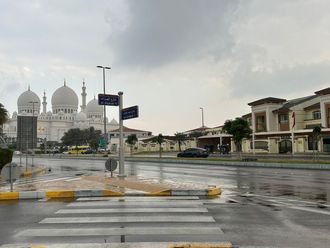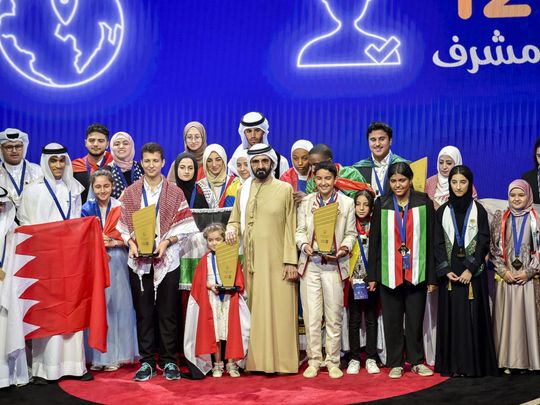
Dubai: The youngest participant in this year’s Arab Reading Challenge, seven-year old Sham Al Bakour from Syria, on Thursday joined the pantheon of Arab reading champions, besting millions of Arab youth from across the world who participated in the annual reading challenge launched by His Highness Sheikh Mohammed bin Rashid Al Maktoum, Vice President and Prime Minister of the UAE and Ruler of Dubai, in 2015.
The awarding ceremony was held at Dubai Opera in front of an audience of more than 2,000 people, which included 360 national and community champions.
Standing beside His Highness during the announcement of winners, Bakour, who was awarded a prize of Dh1 million, displayed confidence and grace at such a young age. She earlier defeated more than 61,000 participants in Syria to claim the right to represent her home country in the biggest reading challenge in the Arab world. Al Bakour won the title after participating in the reading challenge for the first time.
Sheikh Mohammed honoured Al Bakour as the winner of the sixth edition of the Arab Reading Challenge, after being selected from among 22.27 million students from 44 countries — the highest number of participants in a single year since the inception of the reading challenge.
Path towards a better future
Sheikh Mohammed highlighted civilisations begin with enlightenment, and reading enlightens the mind and the path towards a better future for Arab generations. He said: “Our precious Arabic language is in the safe hands of the millions of Arab students and the thousands of volunteers that spare no effort to make this Arab literacy initiative a success.”
His Highness also expressed his confidence in the ability of future generations to preserve the Arabic language. He noted: “The Arab Reading Challenge succeeded in creating the largest knowledge movement in our Arab world. The Arabic book has been taken off the shelf, and put in the hands of our youth, to inspire hearts and minds and light up the path.”
“The Arab Reading Challenge is the greatest gift the UAE could present to the millions of Arab youth, because reading is the key to the future,” he added.
Acknowledging the efforts of all the participants and supporters, His Highness said: “I am grateful to the Ministries of Education throughout the Arab countries, and the thousands of supervisors, and millions of Arab students, for their unique contribution to this unprecedented literacy movement.”
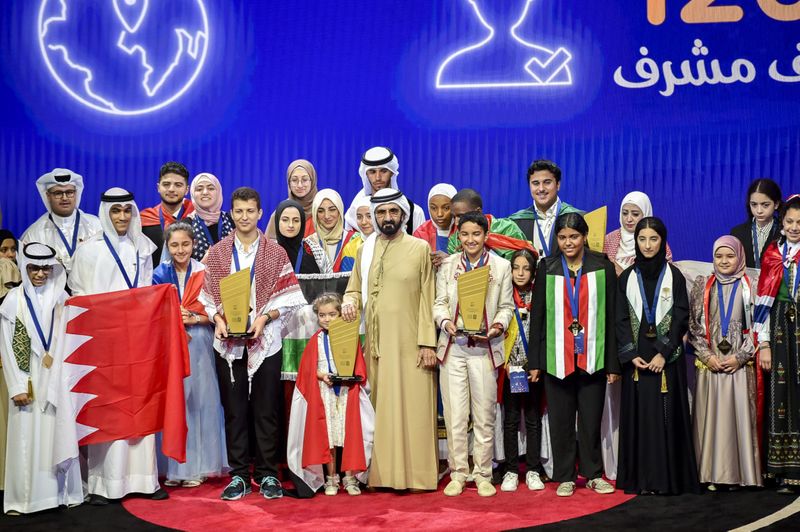
Arab reading champions
Sheikh Hamdan bin Mohammed bin Rashid Al Maktoum, Crown Prince of Dubai and Chairman of The Executive Council of Dubai; and Lieutenant-General Sheikh Saif Bin Zayed Al Nahyan, Deputy Prime Minister and Minister of Interior, also participated in honouring the winners, in the presence of Sheikha Latifa bint Mohammed bin Rashid Al Maktoum, Chairperson of Dubai Culture and Arts Authority; and Mohammed Abdullah Al Gergawi, Secretary General of Mohammed bin Rashid Al Maktoum Global Initiatives.
Sheikh Hamdan honoured the national winners from across the Arab world for the exceptional achievement. Al Bakour, who was crowned the Arab Reading Champion, was givenDh1 million prize.
Finishing in second place was Adam Al Qasimi from Tunisia, while Rashid Al Khateeb from Jordan came in third place, receiving a prize of Dh100,000 and Dh70,000 respectively.
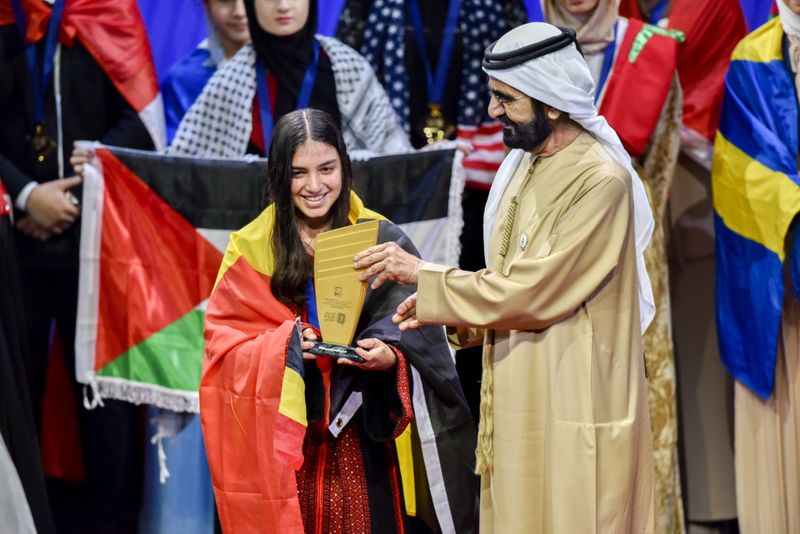
Community champions
Sheikh Saif honoured the community champions from 26 non-Arab countries. The Community Champion Award went to Palestinian student Nada Al Satri, who is living in Belgium. She received a prize of Dh100,000.
Morocco-born Maroua El Bakri, representing Spain, won second place and got Dh70,000 prize, while Nadia Al Bahnasi from Austria won third place and took home Dh30,000.
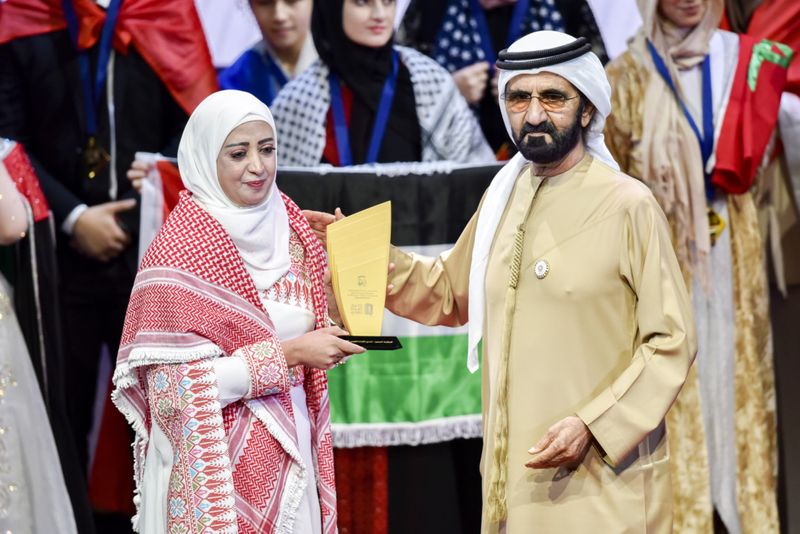
Best school
The Al Mokhtar Gazoulit School from Morocco won the Best School Award and a prize of Dh1 million, besting more than 92,000 schools that participated in the competition.
Al Tarbiyah Al Ahliyah Intermediate and Secondary Private Schools from Saudi Arabia won the second place and Dh500,000, while Al Ahed Al Zaher Secondary School from Bahrain came in third, with Dh300,000 prize.
More than 28,000 schools from Egypt; 24,000 schools from Saudi Arabia; 15,000 schools from Algeria; 10,000 schools from Morocco; 5,000 schools from Tunisia; and 4,000 schools from Jordan participated this year.
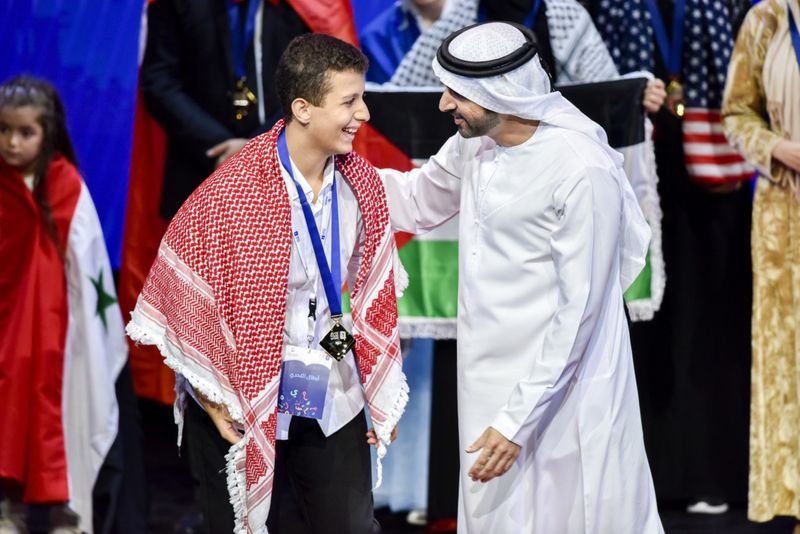
Outstanding supervisor
Noor Mohammad Al Jboor from Jordan won the Outstanding Supervisor Award and a prize of Dh300,000. Abdulrahman Al Harthi from Saudi Arabia came in second, followed by Hanin Al Abdallah from Syria, receiving Dh100,000 and Dh70,000 respectively.
Anthem of Arab countries
The awarding ceremony honoured not only the Arab Reading champions but also highlighted Arabic culture and heritage. A special presentation, the ‘National Anthem of Arab Countries’ operetta featured a selection of artists singing clips from the national anthems of Arab countries.
The ceremony also included a video of milestones from previous editions of the Arab Reading Challenge, as well as songs titled ‘Al Qeraya Nour’ by Abu, and ‘Iqra’ by Mohammed Assaf.
A video clip shared by Mariam Amjoun, the Moroccan champion of the third edition of Arab Reading Challenge, was played during the final ceremony. The video featured an inspirational message urging students to participate in future editions of the Arab Reading Challenge.
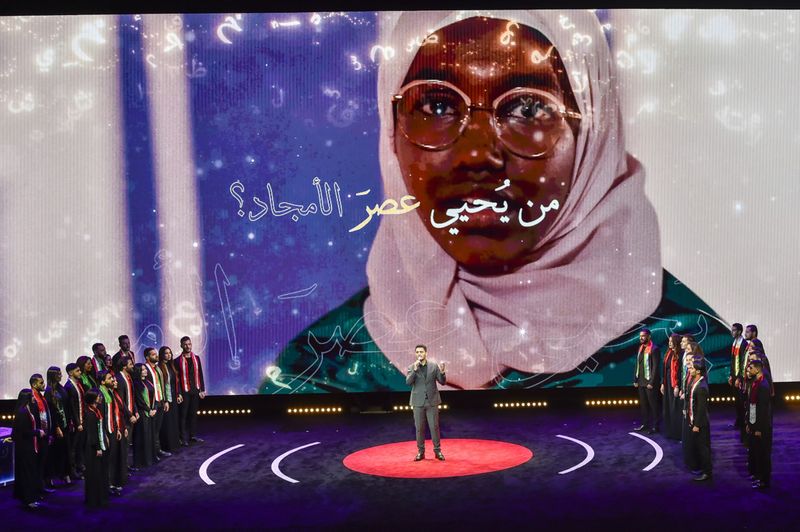
Biggest edition
The sixth Arab Reading Challenge registered 22.27 million participants from 44 countries, making it the biggest edition so far. Approximately 3.6 million students from 19 countries participated in the first edition, with the number doubling in the second edition to more than 7.4 million students from 26 countries. As the third edition allowed entries from outside the Arab world, the number of participants reached 10.5 million from 44 countries. The number of participants in the fourth edition exceeded 13.5 million students from 49 countries, while the number of participants in the fifth edition reached 21 million students from 52 countries.
Arab Reading Challenge is aimed at “instilling a culture of reading and knowledge-seeking among the youth, as well as boosting communication, dialogue, and openness among different cultures. It encourages the youth to aspire for daily reading and academic achievements, advancing the Arabic language and enhancing its role in enriching human civilisation and spreading knowledge.”




